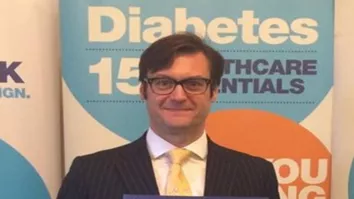Our Diabetes Clinical Studies Groups (CSG) unite researchers in key areas with people living with diabetes and healthcare professionals.

The aim is to identify priority research areas and the clinical studies needed to move diabetes treatment forward more quickly. We hear from Bob, who is a member of one of our CSG and also sits on the board of trustees.
How long have you been volunteering with us?
Four years, in a variety of roles include as a media volunteer and member of Council of People Living with Diabetes.
What attracted you to start volunteering with us?
After the shock of my diagnosis with Type 2 diabetes in 2013 started to sink in, I felt increasingly scared about my diagnosis, and had no real understanding of what I needed to do next. Like many people I had heard that diabetes had serious complications, and five minutes looking up diabetes on the internet confirmed all of my worst fears.
I was lucky that within a few days I spoke to the helpline; as well as answering some basic questions, the team put me on the road towards understanding my condition, learning to self-manage and ultimately to living well with diabetes.
I remain very grateful to Diabetes UK for what was undoubtedly life-changing support, and I hope that by volunteering I can assist others in getting the support they need.
What do you enjoy most about your volunteering role?
The thing I most enjoy about my work as a member of Clinical Studies Group 5 is the variety of things we are involved in. Our priority is to contribute towards identifying research gaps and priorities, which will help Diabetes UK prepare a roadmap for future research. This involves reviewing what research is being done at present or has been done in the past, and how this stacks up against the experience of living with Diabetes. It has been fascinating to work with healthcare professionals, academics and researchers to review the current understanding of diabetes and diabetes care, and to think deeply about how both can be improved.
What difference has volunteering made to you?
Some of the topics that the lay members have raised, such as the role that the female menstrual cycle & menopause play in diabetes self-management, and managing eating disorders in people with diabetes have identified large gaps in current research priorities.
It has been fantastic to have so much positive feedback about this from the broader diabetes community; it really underlines the importance of having people who live with diabetes driving the setting of research priorities.
What impact does your volunteering role have on the people you work with?
My volunteering work with has made me feel much more self-assured as a speaker, and has given me the confidence to better manage my diabetes.
Has volunteering led you onto anything else?
My work as a Diabetes UK media volunteer has led to lots of fantastic opportunities; I was able to attend the Diabetes Professional Conference as a blogger, get involved in the Council of People Living with Diabetes, which lead to me becoming a trustee. A long the way I have met some fascinating people, learnt more about my diabetes and made some great friends.
What would you say to someone thinking of volunteering with us?
Just give it a try. It's great fun, can help you learn more about yourself and your condition, and you will meet some great people along the way.
Go back to Volunteers' Week page or check out our current opportunities.
